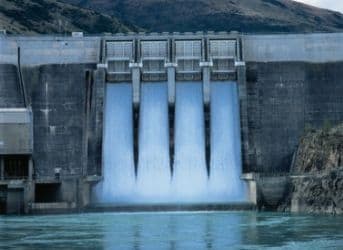Last autumn, Russian President Vladimir Putin and his Kyrgyz counterpart Almazbek Atambayev tried to clarify the Kremlin’s energy ambitions in Central Asia: Putin promised massive Russian investment in the impoverished country’s hydropower sector in return for an Atambayev pledge to enhance economic and security cooperation. But back in Moscow, reservations about the wisdom of investing in Kyrgyzstan are strong.
On the surface, the hydropower project has received the green light at every turn, coming a step closer to reality on April 16, when the Russian State Duma passed a resolution affirming intentions to build both Kambarata-1 – a giant dam that Kyrgyzstan hopes will turn the country into a major electricity exporter – and four smaller generators further upstream on the Naryn River. Nevertheless, the costs and risks, the uncertain economies, and neighboring Uzbekistan’s perennial opposition still have the potential to turn feet cold in Moscow, say analysts.
The revived Soviet-designed project looks impressive on paper. Quoted by Kyrgyz state media on April 16, Dmitri Sablin, deputy chair of the Russian legislature’s Committee on CIS Affairs, announced the Naryn River facilities’ total annual output is projected to be over 5 billion kilowatt hours. While RusHydro will build the four generators referred to as the Upper Naryn Cascade, another Russian state-run company, Inter RAO, will oversee the $2-billion Kambarata-1 facility, Sablin said. Combined, the two projects could total over $3 billion. Sablin expects Kambarata-1 – which was designed to produce 1,900-megawatts, but Inter RAO has pushed for something smaller – to be built in seven years.
Will Moscow live up to its promises, though? Inter RAO reported a loss of $721 million last year, and company executives had considered delaying Kambarata-1 before reportedly coming under pressure from the Energy Ministry this winter. Russian media outlets have suggested that the companies are not thrilled about being strong-armed into proceeding with the projects. And the Economics Ministry warned this month that Russia risks sliding into recession.
Related article: Iran Abandons Chinese Help, to Build World’s Highest Hydroelectric Plant Alone
The Atambayev-Putin deal guarantees Inter RAO a 75-percent stake in Kambarata-1 until the project breaks even, after which the two sides will share profits equally. But that could take more than 12 years – eons by the standards of Kyrgyzstan’s rowdy politics. Add a business climate that “represents a high risk for any investor,” and any hesitation on the part of Inter RAO is understandable, says Ajdar Kurtov, a Central Asia expert at the Moscow-based Russian Institute for Strategic Studies. For now, Kyrgyzstan’s hydroelectric potential “exists only on paper.”
On March 29, Inter RAO awarded Canada's SNC-Lavalin a $5-million tender to undertake a Kambarata feasibility study. It is still unclear when construction would begin.
The hydropower deals were part of a package of accords signed during Putin’s visit that were seen as designed to bring Bishkek firmly back into Russia’s geopolitical orbit.
For a nominal fee, Moscow got a military base until at least 2032 and agreed to immediately write off of almost $200 million of Bishkek’s debt. The remaining $300 million that Kyrgyzstan owes Moscow – a loan given to ex-President Kurmanbek Bakiyev for the construction of Kambarata-1 back in 2009, but not used for its intended purpose – is due to be written off over a 10-year period starting in 2016. By this time Kyrgyzstan is expected to be a member of the Moscow-led Customs Union, a trade block Putin has pushed and that would give Russia greater leverage in countries that were formerly part of the Soviet Union. Russian lawmakers ratified the debt deals on the same day as the hydropower agreement, but not without hackles from some MPs.
One prominent critic was Liberal Democratic Party leader Vladimir Zhirinovsky, a nationalist dilettante many see as a foil for Putin. Zhirinovsky complained that Kyrgyzstan had become “habituated” to Russian assistance and suggested the country should give Russia Lake Issyk-Kul – a Kyrgyz national treasure – in return for the debt write-off. He then voted for the deal.
Another Duma faction abstained, citing Moscow’s own budget difficulties, a lack of investment in its own underdeveloped regions, and the “ineffectiveness” of Russia’s overtures to Kyrgyzstan in the past.
Such comments are not encouraging for Kyrgyzstan’s leaders, who envision the Naryn facilities developing into important sources of revenue to boost their struggling economy. Ultimately, says Vladimir Bogatyrev, head of the Bishkek-based think-tank Perspective, the future of the hydropower deal, as well as other agreements, depends “on political developments in Russia itself.”
Related article: Burma, Emerging from International Isolation, Pursues Major Hydroelectric Plans
Another variable is Uzbekistan, a Central Asian heavyweight that depends on water from Kyrgyzstan to irrigate its cotton fields. Tashkent’s opposition to Kambarata-1 (and a similar project in Tajikistan, Rogun) is “categorical,” Bogatyrev says, and may give Moscow pause since Kambarata-1 is primarily “a political project,” and thus bound to Russian political calculations. Karimov completed a rare visit to Moscow on April 15. Central Asian hydropower projects did not feature in the joint statement he and Putin released, but it is almost certain Karimov, who has said such projects in the region could lead to “war,” raised the topic.
ADVERTISEMENT
Kurtov of the Russian Strategic Studies Institute sees the Tashkent factor as less important. “Uzbekistan is not in an economic position to dictate terms to Russia,” he said. But he argues that Putin, whose own ambitions to bring the Central Asian states back into Russia’s fold are no secret, will be critical for ensuring the survival of the Kambar-Ata-1 project.
“Various politicians in Russia have their own views regarding deepening integration with Central Asia. Many do not support it,” Kurtov told EurasiaNet.org by telephone. But with Putin in office for at least five more years Kyrgyzstan has a “lucky chance” to see the project realized, he says. “The Kyrgyz side must prove themselves reliable partners during this period.”
By. Chris Rickleton


















